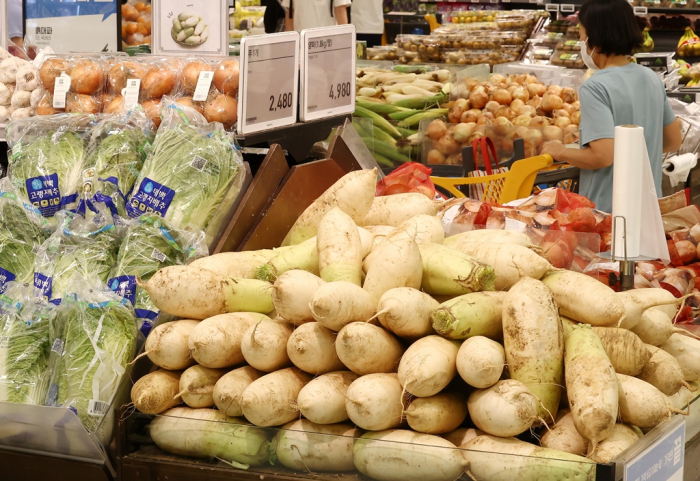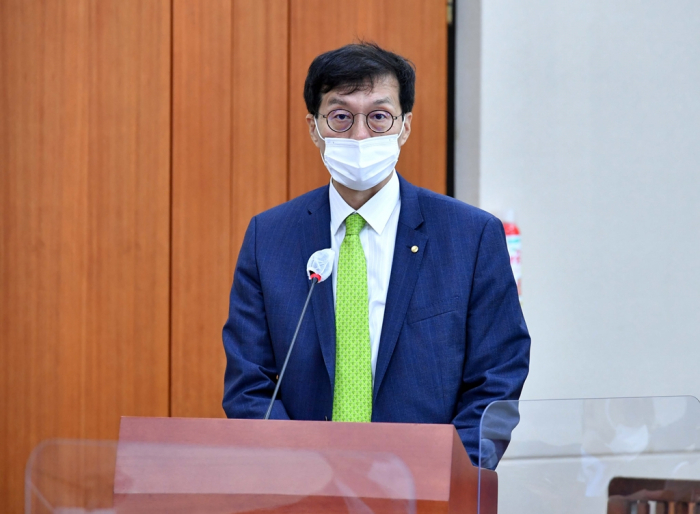Economy
Korea inflation hits highest point since 1998 crisis, BOK to hike rates
Bank of Korea Governor Rhee Chang-yong reiterates that 25-bp rate hikes look appropriate in the coming months
By Aug 02, 2022 (Gmt+09:00)
3
Min read
Most Read
LG Chem to sell water filter business to Glenwood PE for $692 million


KT&G eyes overseas M&A after rejecting activist fund's offer


Kyobo Life poised to buy Japan’s SBI Group-owned savings bank


StockX in merger talks with Naver’s online reseller Kream


Meritz backs half of ex-manager’s $210 mn hedge fund



South Korea’s inflation accelerated further last month to its highest point since the 1997-98 Asian financial crisis, adding to expectations that the central bank may again raise interest rates, although the hikes are predicted to be lower than its latest tightening, given signs of an economic downturn.
Consumer prices in Asia’s fourth-largest economy grew 6.3% in July from a year earlier, the fastest rate since November 1998, after a 6% increase in June, government data showed on Tuesday. It was the first time the prices rose by 6% or higher for a second straight month since the October-November 1998 period.
Prices of industrial products including refined oils rose 8.9% with diesel and gasoline costs up 47% and 25.5%, respectively. Utility prices surged 15.7%, the highest since 2010 when the country started compiling such data, on a hike in electricity bills.
Prices of agricultural and livestock products also gained 7.1% as vegetable prices soared 25.9% on the heat wave and rainy season.
“Consumer inflation is expected to stay above 6% for the time being as oil prices remained high and demand-driven inflationary pressure intensified with inflation expectations staying elevated,” said Bank of Korea Deputy Governor Lee Hwan-seok.
USUAL 25-BP HIKES EXPECTED
BOK Governor Rhee Chang-yong reiterated that the central bank plans to raise interest rates by the usual 25 basis points (BPS) to bring rampant inflation under control, although he did not rule out another 50-bp hike.
The BOK last month took the most aggressive measure with a 50-bp policy interest rate hike for the first time in its history to curb inflation.
“It is necessary to raise the policy interest rate as inflation is expected to remain high for the time being,” Rhee told lawmakers on Monday. “We believe it is appropriate to gradually increase the rate by 0.25 percentage points each time for now.”
The move is predicted to ramp up the base interest rate to as much as 3% by year-end from the current 2.25% since the central bank is scheduled to hold three more policy meetings in 2022 – on Aug. 25, Oct. 12 and Nov. 24.
Inflation is likely to peak in the next two to three months, Finance Minister Choo Kyung-ho said, indicating rate hikes at the usual 25-bp pace may be enough to cool prices.
“I think prices will peak at the end of September or no later than October, considering the current oil price trends and various other conditions,” Choo told lawmakers on Monday.
RISKS OF ECONOMIC SLOWDOWN
Rhee flagged risks of an economic slowdown, saying the global economy is losing steam on the monetary policy tightening worldwide and the sustained war in Ukraine.

“We are closely watching the possibility that (South Korean) economic growth will be lower than 2% next year as the overseas situation is deteriorating,” he said. The BOK said growth in 2022 is likely to miss the central bank’s earlier forecast of 2.7%.
Adding to concerns over an economic downturn, South Korea reported a trade deficit against China in July, the third month in a row, for the first time since the establishment of diplomatic ties between the two countries in 1992, separate government data showed on Monday.
The country logged a shortfall of $570 million in trade with China last month after deficits of $1.2 billion in June and $1.1 billion in May, according to the Ministry of Trade, Industry and Energy.
Exports of displays and auto parts to South Korea’s largest overseas market tumbled 34.1% and 24.9%, respectively. Petrochemical shipments also declined 14.1%.
Write to Jung-hwan Hwang, Do-Won Lim and Ji-Hoon Lee at jung@hankyung.com
Jongwoo Cheon edited this article.
More to Read
-
 Central bankBOK delivers first-ever 50-bp hike to curb inflation
Central bankBOK delivers first-ever 50-bp hike to curb inflationJul 13, 2022 (Gmt+09:00)
3 Min read -

Comment 0
LOG IN


